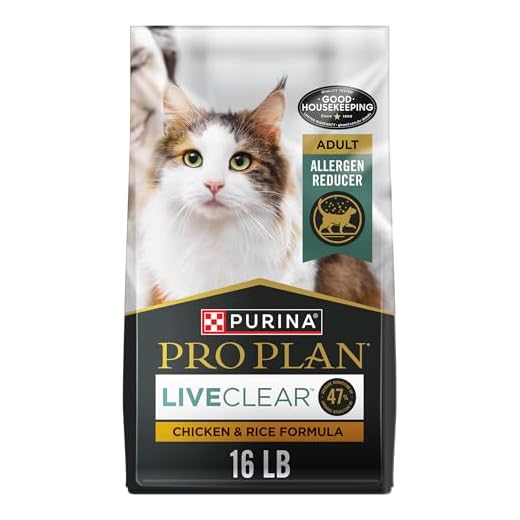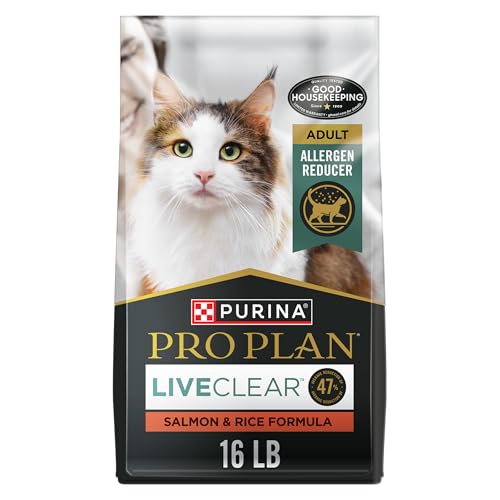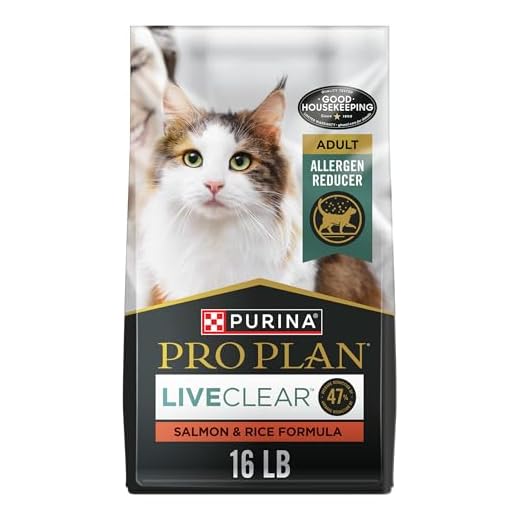



Eating poultry has been a favorite for many companions, but it’s essential to understand how it affects our health. I’ve encountered some furry friends who experience discomfort after consuming fowl, leading to digestive issues and skin irritations. If you notice odd behaviors or symptoms in your feline friend after they munch on bird meat, it might be worth considering an alternative protein source.
Consulting with a veterinary expert is crucial if any signs of distress appear. They can provide tailored advice based on your companion’s specific needs and dietary habits. Switching to fish or lamb could be beneficial, as these proteins often present fewer complications for sensitive tummies.
Pay close attention to your buddy’s reactions. A sudden change in appetite, excessive grooming, or frequent scratching could hint at an underlying issue linked to poultry. Keeping a food diary may help track any patterns and assist your vet in making informed recommendations. Remember, prioritizing your furry pal’s well-being is key to a happy and healthy life together.
Are Cats Allergic to Chicken?
Many of us enjoy the taste of poultry, but it can be problematic for some felines. It’s wise to observe for signs of sensitivity, such as itching, gastrointestinal upset, or skin irritations after consuming this type of meat. If you notice these issues, it’s best to consult a veterinarian for advice tailored to individual needs.
Considering alternatives is a good approach. There are plenty of protein sources available that might be better tolerated, like fish or certain types of lamb. Conducting a food trial with a novel protein can help determine what suits your furry friend best.
Always prioritize a balanced diet. Check labels for hidden ingredients and allergens, as even treats may contain traces of poultry. Keeping a close watch on feeding habits and reactions helps ensure a happy and healthy life.
Identifying Symptoms of Chicken Allergy in Cats
If you notice your feline friend showing signs of discomfort after consuming poultry, it’s crucial to observe specific symptoms. Common indicators include persistent itching, excessive grooming, and skin irritations such as redness or rashes. Watch for gastrointestinal disturbances like vomiting or diarrhea, which may signal a negative reaction to this protein source.
Another sign can be respiratory issues, such as sneezing or coughing, indicating a potential sensitivity. Ear infections may also occur, leading to shaking of the head or scratching at the ears. If you suspect a reaction, removing poultry from the diet and consulting with a veterinarian is advisable for proper diagnosis and management.
Monitoring and documenting your companion’s reactions can aid in identifying triggers. For any persistent issues, consider a hypoallergenic diet to help alleviate symptoms. While addressing dietary concerns, don’t forget to manage litter box odors effectively; you can find tips here.
Alternative Protein Sources for Felines with Poultry Sensitivity
Consider options like fish, turkey, or lamb for those with a sensitivity to poultry. Fish, particularly salmon or tuna, offers high omega-3 fatty acids, promoting a healthy coat and skin. Turkey is a lean protein that many enjoy, often serving as an excellent substitute for chicken in meals.
Lamb can also be beneficial, especially for those who require novelty proteins. It’s less commonly used in commercial cat foods, making it a great alternative for sensitive tummies. Additionally, venison and rabbit are excellent choices, providing unique flavors and nutritional benefits without triggering adverse reactions.
When transitioning to a new protein source, it’s essential to do so gradually. Mix the new protein with the current food over several days to help avoid gastrointestinal upset. Always consult with a veterinarian before making significant changes to your diet.
For more insights on health-related topics, check out this link on how does getting a male cat fixed stop them from spraying.
Eating poultry has been a favorite for many companions, but it’s essential to understand how it affects our health. I’ve encountered some furry friends who experience discomfort after consuming fowl, leading to digestive issues and skin irritations. If you notice odd behaviors or symptoms in your feline friend after they munch on bird meat, it might be worth considering an alternative protein source.
Consulting with a veterinary expert is crucial if any signs of distress appear. They can provide tailored advice based on your companion’s specific needs and dietary habits. Switching to fish or lamb could be beneficial, as these proteins often present fewer complications for sensitive tummies.
Pay close attention to your buddy’s reactions. A sudden change in appetite, excessive grooming, or frequent scratching could hint at an underlying issue linked to poultry. Keeping a food diary may help track any patterns and assist your vet in making informed recommendations. Remember, prioritizing your furry pal’s well-being is key to a happy and healthy life together.
Are Cats Allergic to Chicken?
Many of us enjoy the taste of poultry, but it can be problematic for some felines. It’s wise to observe for signs of sensitivity, such as itching, gastrointestinal upset, or skin irritations after consuming this type of meat. If you notice these issues, it’s best to consult a veterinarian for advice tailored to individual needs.
Considering alternatives is a good approach. There are plenty of protein sources available that might be better tolerated, like fish or certain types of lamb. Conducting a food trial with a novel protein can help determine what suits your furry friend best.
Always prioritize a balanced diet. Check labels for hidden ingredients and allergens, as even treats may contain traces of poultry. Keeping a close watch on feeding habits and reactions helps ensure a happy and healthy life.
Identifying Symptoms of Chicken Allergy in Cats
If you notice your feline friend showing signs of discomfort after consuming poultry, it’s crucial to observe specific symptoms. Common indicators include persistent itching, excessive grooming, and skin irritations such as redness or rashes. Watch for gastrointestinal disturbances like vomiting or diarrhea, which may signal a negative reaction to this protein source.
Another sign can be respiratory issues, such as sneezing or coughing, indicating a potential sensitivity. Ear infections may also occur, leading to shaking of the head or scratching at the ears. If you suspect a reaction, removing poultry from the diet and consulting with a veterinarian is advisable for proper diagnosis and management.
Monitoring and documenting your companion’s reactions can aid in identifying triggers. For any persistent issues, consider a hypoallergenic diet to help alleviate symptoms. While addressing dietary concerns, don’t forget to manage litter box odors effectively; you can find tips here.
Alternative Protein Sources for Felines with Poultry Sensitivity
Consider options like fish, turkey, or lamb for those with a sensitivity to poultry. Fish, particularly salmon or tuna, offers high omega-3 fatty acids, promoting a healthy coat and skin. Turkey is a lean protein that many enjoy, often serving as an excellent substitute for chicken in meals.
Lamb can also be beneficial, especially for those who require novelty proteins. It’s less commonly used in commercial cat foods, making it a great alternative for sensitive tummies. Additionally, venison and rabbit are excellent choices, providing unique flavors and nutritional benefits without triggering adverse reactions.
When transitioning to a new protein source, it’s essential to do so gradually. Mix the new protein with the current food over several days to help avoid gastrointestinal upset. Always consult with a veterinarian before making significant changes to your diet.
For more insights on health-related topics, check out this link on how does getting a male cat fixed stop them from spraying.
Eating poultry has been a favorite for many companions, but it’s essential to understand how it affects our health. I’ve encountered some furry friends who experience discomfort after consuming fowl, leading to digestive issues and skin irritations. If you notice odd behaviors or symptoms in your feline friend after they munch on bird meat, it might be worth considering an alternative protein source.
Consulting with a veterinary expert is crucial if any signs of distress appear. They can provide tailored advice based on your companion’s specific needs and dietary habits. Switching to fish or lamb could be beneficial, as these proteins often present fewer complications for sensitive tummies.
Pay close attention to your buddy’s reactions. A sudden change in appetite, excessive grooming, or frequent scratching could hint at an underlying issue linked to poultry. Keeping a food diary may help track any patterns and assist your vet in making informed recommendations. Remember, prioritizing your furry pal’s well-being is key to a happy and healthy life together.
Are Cats Allergic to Chicken?
Many of us enjoy the taste of poultry, but it can be problematic for some felines. It’s wise to observe for signs of sensitivity, such as itching, gastrointestinal upset, or skin irritations after consuming this type of meat. If you notice these issues, it’s best to consult a veterinarian for advice tailored to individual needs.
Considering alternatives is a good approach. There are plenty of protein sources available that might be better tolerated, like fish or certain types of lamb. Conducting a food trial with a novel protein can help determine what suits your furry friend best.
Always prioritize a balanced diet. Check labels for hidden ingredients and allergens, as even treats may contain traces of poultry. Keeping a close watch on feeding habits and reactions helps ensure a happy and healthy life.
Identifying Symptoms of Chicken Allergy in Cats
If you notice your feline friend showing signs of discomfort after consuming poultry, it’s crucial to observe specific symptoms. Common indicators include persistent itching, excessive grooming, and skin irritations such as redness or rashes. Watch for gastrointestinal disturbances like vomiting or diarrhea, which may signal a negative reaction to this protein source.
Another sign can be respiratory issues, such as sneezing or coughing, indicating a potential sensitivity. Ear infections may also occur, leading to shaking of the head or scratching at the ears. If you suspect a reaction, removing poultry from the diet and consulting with a veterinarian is advisable for proper diagnosis and management.
Monitoring and documenting your companion’s reactions can aid in identifying triggers. For any persistent issues, consider a hypoallergenic diet to help alleviate symptoms. While addressing dietary concerns, don’t forget to manage litter box odors effectively; you can find tips here.
Alternative Protein Sources for Felines with Poultry Sensitivity
Consider options like fish, turkey, or lamb for those with a sensitivity to poultry. Fish, particularly salmon or tuna, offers high omega-3 fatty acids, promoting a healthy coat and skin. Turkey is a lean protein that many enjoy, often serving as an excellent substitute for chicken in meals.
Lamb can also be beneficial, especially for those who require novelty proteins. It’s less commonly used in commercial cat foods, making it a great alternative for sensitive tummies. Additionally, venison and rabbit are excellent choices, providing unique flavors and nutritional benefits without triggering adverse reactions.
When transitioning to a new protein source, it’s essential to do so gradually. Mix the new protein with the current food over several days to help avoid gastrointestinal upset. Always consult with a veterinarian before making significant changes to your diet.
For more insights on health-related topics, check out this link on how does getting a male cat fixed stop them from spraying.











